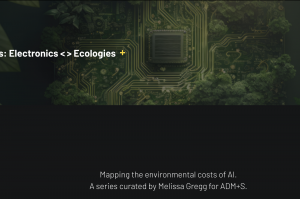Electronics Ecologies is a new series focused on the environmental impacts of AI curated by Mel Gregg, hosted amidst the Asia Pacific region “primarily because this is where so much of our technology begins and ends”. This is a realm where Big Tech has nestled itself into arrangements of convenience with so-called developing countries in the Global South to cheaply extract human labour, mineral ingredients, water and electricity to primarily feed the Internet habits typically driven by the ‘Global North’.
The second in the series takes place in October 2023 in the Eora Nation SYDNEY, focusing on Waste, Electronics discards, reuse & recycling – October 2023, it calls for “experiments that foreground the value of electronics discards and best practices for product stewardship are particularly welcome, to show the ongoing potential of technology’s many lives and afterlives”.
In response to these conundrums, the series of Electronics Ecologies seeks to offer a variety of diverse propositions through scoping the counter-culture movements of improvised repair shops, minimal computing, slow internet, and collapse informatics. In a bid to deeply learn, share and understand the anomalies of how people in communities talk back and engage with techno-politics, all the while sensing, feeling, and then acting. Contemplating the sacrifices many of us must make to continue living in a way that isn’t merely surviving will mean actively seeking a remedy and, through patching, negotiating a new set of less expedient prospects.
Mel Greg, is a visiting professor at the Centre of Excellence for Automated decision-making Society for 2023. Formerly Principal Engineer and Research Director, Client Computing Group, Intel, and the author of books such as Work’s Intimacy and most distinguishing, she’s Tasmanian.
The first event Electronics>< Ecologies #repair 30 August 2023, in Meeanjin/BRISBANE foregrounded the constraints, possibilities, limitations and physical impacts of digital systems in all their bio-socio-cultural-elemental variety and components.
I’m often straddling the nexus of performance art, computer culture, human-computer interaction, and diverse economics, that seek to reinvigorate, and empower the reader/audience/users/.*, innate sensory perceptual apparatus. Therefore, as the last talk of the day, I was planning about Feminist Server Stacks to-come with chanting through the prolific list of elements and minerals mined across vast unceded lands. Placing these into my conceptual cauldron, conjuring, invoking, propitiating the geopolitical talismanic energies unearthed in material extraction, use, reuse and recycling. I intended to summon the vast shared electromagnetic spectrum in a spell to quell the vaunted unsustainable efficiencies of necropolitical growth (cannibal type) strategies that haunt the interconnected webs of computing devices, fibres, aether, living visceral networks, storage infrastructure and web servers.
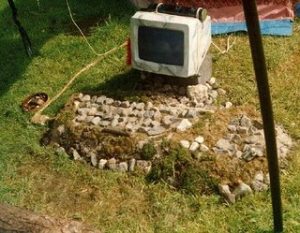
We are looking at a Hippies from Hell stone computer from one of the first series of Hacking at Large Hacker camps in the south of The Netherlands. I attended ‘What The Hack’ in 2005. which originates from a group of people centred around a small hacker magazine called Hack-Tic (last issue 1993).
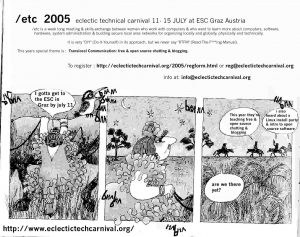
/eclectic tech carnival seeding ground for radical self-determined feminist server communities, a distributed planetary collective with local/ regional branches
Josh Lepawsky and Steve Jackson set the tone for the first Electronics>< Ecologies #repair discussion kicking off the day with in depth discussions that described witnessing the visceral ecological impact of the repair movement ecosystem and highlighting the value of informal micro social aspects in repair counter cultures. It was also refreshing to hear that they were intrigued about the term permacomputing, citing its provenance as in the Netherlands, noting the curious paradoxes but little more than a small counter culture manifestation with an ambiguous tendril in Tasmania. These early insights encouraged me to whip up a new tacit angle to my presentation. Revisiting the past two decades of the solidarity networks activities and collaborations that led to my current thoughts on Feminist Server Stacks to-come (some of these thoughts can be found in the book Data Farms: Circuits, Labour, Territory). The importance of tacit knowlege, in the maintenance routines of installations configuring intimacy in the immediacy of exploring the terminals of virtual machines; or making antennas from USB Wifi component placed in the centre of a large noodle strainer hanging out ones window in the city from a red ribbon; or simply touching the CPU and naming the hardware; lovingly naming webservers and driving them to their designated location; tripping out on the 66 ecelctic minerals that make up circuit boards. Not to mention the mystical possibilities of WiFI signals intermingling with electro magnetic fields through rituals acts of repair induced through modes of feminist led hands-on experiential learning. Digging into the hardware by naming components to demystify and touch the mechanisms that execute software scripts, is to experience and grasp the provenance of Internet materiality that can lead us to imagine beyond the known and possible. (This is not a repeat of my talk btw it is a report and a reflection on the event).
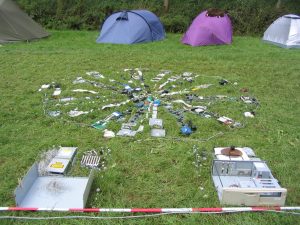
Image from ‘What The Hack’ 2005 A hardware Mandala installation, a site-specific ‘spiritual hack’ that required hands-on demolition and re-construction.
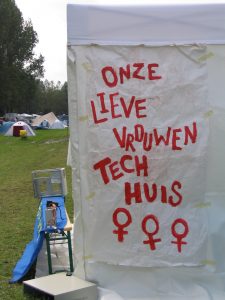
‘Onze Lieve Vrouwen Tech Huis’ a place where people can meet, drink tea and eat cookies, re-install Macs with Linux, audio stream a radio show, learn CMS, make a Mandala using old hardware, discuss Wavelan, life love and other catastrophes, and many other interesting topics regarding free software in a comfy environment.
Permaculture as a practice is also quite common in the Island of lutruwita/Tasmania. Arguably it is context that gave birth to the novel term (coined by Bill Mollison and David Holmgren in the mid 1970’s) so it was the first Green party in the world in 1972, whose pragmatic reuse-reduce-recycle motto is now a common term globally. The Art from Trash annual show, hosted by TIP/junkyard shops and 24 Carrot Gardens led by artist-designers working with challenged socio economic areas. Projects like these in different ways foster a context that generally validates initiatives that inspire waste redirection and re-use of unwanted surplus are all examples of initiatives rooted in efforts from Tasmania, and that is in the spirit of bricolage and Human Induced Regeneration (HIR) with a zero-waste policy and carbon neutral agenda. It should be noted the lack of literature by indigenous people at the moment where the procedures and rituals of living in the ways of Permaculture originated and have been systematised and to some extent have been appropriated.
The forthcoming 11.2023 Forest Economics Congress aims for local “material-based conversations” to build a bridge into a sizzling logging debate. Its inception has sparked an enormous kickback from the political left, namely, Greens trying to halt a conversation from happening with the generational workers whose bread and butter are logging. The article FOREST ECONOMICS CONGRESS: NEW A$$. CLASS and the public comments notwithstanding the assumptions of colonisation on relations to trees as commodity rather than as fellow kin, set the scene adequately for those that are interested in tuning into the frequencies of this island state.
These are just some of the barriers to environmentally sustainable living in the 21st Century., where “Ultimately, integrity must win. And if you’ve got a (HIR) project that will account for potentially half of all carbon credits issued between now and 2030 and it stinks, you really need to do something about it.” Not to mention the rebound effect, whereby increased efficiency leads to greater demand. The awareness that rivers act as muses who send us inspirations that help us serve them better, sentient water spirits, and tactical magick faerie circuits to work on behalf of every substrate on earth.
Alas I diverge. To build a life where we could be at least partially self-sufficient, as instilled in many of us who grew up on the island. Part of this process was doing a permaculture design certificate with hands-on learning as a 19-year-old. It seeded the ground for a holistic understanding of things and other experiential pedagogical experiences with which post-modern dance is the apex. I recall swinging about the term Permacomputing around 1999 somewhere in between the discovery discovered the world of FLOSS in the depths of hidden counter culture gatherings with the GenderChangers Academy. Whilst lovingly and clumsily hands on coding learning through regular practise of minimal computing that privileges commandline tools (such as ffmpg) over the CPU intensive bloated software packages (like Adobe) where codes are brash and unforgiving at times. After more than a decade of absence I travelled as Weaver Bird with Jaromil to the Merapi volcanos in Yogyakarta, we discussed permacomputing and bricolage. To see if the southern island could still be my home. In 2008 I began to seed the ground for a homebrew a feminist led web server atelier….
Whatever the case, and whoever decides to wear the crown coinment. there is no doubt Permacomputing is gaining currency. As the world leaps into a phase of species collapse as it simultaneously speeds into yet another industrial automation consumption.
With the best and earnest intentions, People have gathered together to earnestly make a list to evaluate ‘true’ environmentally responsible practices. Some of the positions I have read are very instructive and informative. But some of the tone also leads me to wonder if we should be wary of influences that dismiss exuberance or misjudge enthusiasm as not having enough gravity to be considered as having value. Because without spirited approaches, many become anaesthetised to life itself, through living beings, a immeasurable realm of poetics graces our traces which should be welcomed and cherished as these types of atmospheres encourages a diverse array of living beings to act in solidarity.
From this brief detour and overview, I posit that autonomous holistic computing practices in the southern hemisphere may be a guiding light for permacomputing and related movements. One example is The Collapsible Project led by Julian Oliver based in New Zealand, another related is Holistic Computing Conversations, at at autoluminescence institute, led by yours truly.
In a grassroots, convivial, situated and holistic ways we may find best practices for making computational conjunctions somewhat sustainable engagements.
This also compels my desire to report on some of the meta-level of some of the Electronics>< Ecologies #repair talks (because you can see the programme for yourself to glean the miniature) and a video will be shared shortly too.
Another notable finding from the Electronics>< Ecologies #repair presentations was many mentioned feminist methods but not explicitly so i.e., codesign, visceral witnessing, awareness raising. It was a thrill to hear these conceptual terms and methods had been integrated as a parlance of the critical media, cultural studies social science canon, at least at this event.
Developing feminist perspectives on the current data societies and regimes we are living in has never felt so possible.
On the other hand, it was clear that in many right to repair success cases, after navigating the labyrinth of the Law, often innovating efficiencies usually translates to increased growth and then again, a higher environmental footprint. Also, there is the fact that in emergent cultures of repair, researchers tend to exclude variables that are too hard to quantify in the aim of right-to-repair, resource extraction, carbon footprint, water use, and data colonialism. For instance, the proposed Google data centre in Uruguay that will use vast quantities of freshwater, while citizens have to drink salty water. “In a statement, Google said the hub would serve Google users worldwide, processing requests for services such as YouTube, Gmail and Google Search.”
Another surprising, yet well-worn trope was put forth by a researcher proposing the Western quest for individuation vs. the Eastern quest for authority. Our trusted curator Mel Greg was well poised to point out the illusion that each of us/our nation states are alone and separate and that we are all inhabitants of the planet northeast-southwest, frequencies entangled, we are best served with tuning in to how we can better approach techno-politics within our lives together. Galvanised the importance of events like this to build bridges with diverse actors and talk through inherited perceptions we may want to reconsider. An exciting talk on by Changwen Chenwang and Yifan Wang, “technology journalist, a new media artist, and a constantly-becoming soft blob that embraces boundary deconstruction, relation-building, DIY spirits and non-institutional ways of existence” on Mobile Phone Repair in Huaqiangbei, Shenzhen, China’. This survey of counter-cultures to neoliberal capitalist societies are so often unwisely dismissed, brought a great sense of hope and insight into the DIY proactive cultures on TikTok. Refreshingly the next generations perspective of ‘grotesque’ facial capture tactics of the iPhone, shone a light into the humour and resilience to countervailing forces. Defending people’s needs against the brutality of profit-driven capitalist, enthusiastically modding to give other options to consumption and digital obsolescence where products are defective by design.not merely driven by carbon credits, corporate greenwashing in a somnambulistic lurch for a zero-waste policy and carbon neutral agenda by 2030.
These are some of the emerging subcultures that were put forth in Electronics>< Ecologies series that contributes to awareness raising of the multitude of ways, remedies and substrates that comprise the interconnected webs of computing devices, networks, data storage, and servers (data centres) and related cultural practices, of which environmental impacts are planetary in scope.
This text was a little emotive and anecdotal. I’ll now share some facts from Gerry Mc Govern.com World-Wide-Waste
*1.6 billion trees will have to be planted to offset the pollution caused by email spam; *16 million trees will need to be planted to offset the pollution caused by the estimated 1.9 trillion yearly searches on Google; *1.5 billion trees will need to be planted to deal with annual e-commerce returns in the USA; *231 million trees will need to be planted to deal with the pollution caused due to the data citizens consumed in 2019. It is proposed that "If we simply deleted 90% of the data stored, we would have 90% fewer data centres."
But deleting data needs to be integrated into our cultural rituals, home brewed as a habit. Digital literacy and inclusion is still an issue for many… there’s so much to discuss and consider. Now, more than ever, the world needs self sufficiency self determination efforts towards the awkwardness of entanglements, embracing anomalies, weirdness that is not able to be measured or prescribed, and bedlam antics that move away from insidious, data centre hum-deadening monotone amid the fiery crescendos of the burning planet.
All the while, the cat sits on the keyboard.
To be continued..
